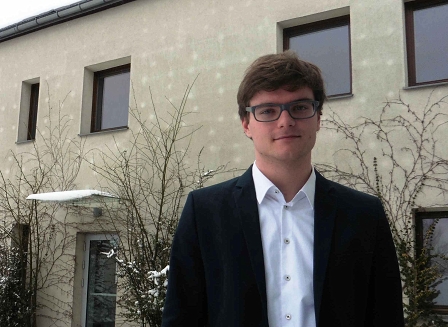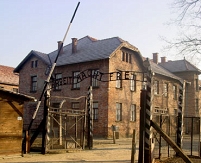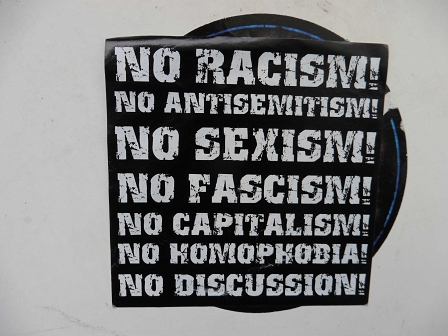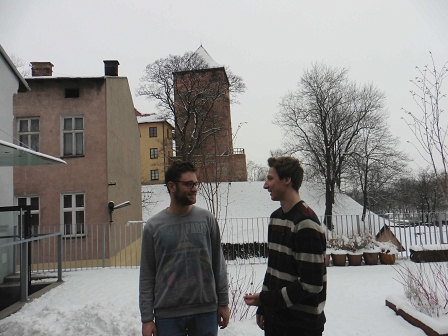Erstellt am: 27. 1. 2015 - 19:03 Uhr
A Vivid Reminder
It’s a grim cold day in Oscwiecim, with flurries of snow blown under an iron-grey sky across the former barracks of the Auschwitz concentration camp. Snow has clung to the stretches of barbed-wire left standing as a living reminder that this small town, 70km west of Krakow, once hosted the most grimly efficient mechanisms of mass murder ever dreamed up by man.
Flucht nach Israel
70 Jahre nach dem Holocaust wandern alleine aus Frankreich siebentausend jüdische Mitbürgerinnen nach Israel aus. Auch in Österreich steigt die Unsicherheit. Woher kommt der "neue" Antisemitismus?
Swaddled in layers of modern clothing and with a full belly, I feel the cut of the vicious wind as I stand on a former parade ground, trying to imagine what it was like for the underfed, overworked, thinly clothed prisoners who were made to stand each morning for role call, punished at whim by being sprayed naked with cold water.

Chris Cummins
"Visiting the memorial at Auschwitz is an overwhelming experience," says Gedenkdiener Daniel Haim, 22, "walking through the barracks, seeing where the terror physically happened, is something that leaves you without any thoughts. You can’t comprehend it."
The mind resists such imaginings, but in the lobby of an Oswiecim hotel in the morning, I meet some elderly Holocaust survivors who know exactly what such cruelty means. It wasn’t as long ago as we’d like to believe. Frail but dignified, they lit candles and laid wreaths at the so-called "Death Wall" at Block 11. This round anniversary of the liberation of the camp is particularly poignant, because it is perhaps the last big occasion where eyewitnesses will be fit enough to travel and take part in such ceremonies.
The horrors of the Holocaust are slipping out of living memory soon they will be confined to the annals of history books where they will be challenged by unhinged Holocaust deniers. This historic warning faces being diluted or relativized at a time when the historic warning of Auschwitz feels necessary like rarely before.

Chris Cummins
Tobias Fädler works with youth groups for whom the 1940s might seem like distant history, but Tobias insists that it has relevance because "History is what made us what we are now and we can learn from everything that has happened. It is not impossible that such a thing could happen again".
This month French Islamists slaughtered shoppers in a Kosher supermarket, apparently choosing their target for no other reason than that their victims would likely to be Jewish. It should come as no surprise. Melanie Phillips of the London Times reports that attacks on Jews have risen sevenfold since the 1990s. In 2013 a poll of 6,000 Jewish people in 8 EU states found that three-quarters in Europe felt that anti-Semitism was on the increase. In Austria, players from the Israeli team Maccabi Haifa were rounded on by anti-Semitic fans.
The vibrant return of Jewish life to places like Oswiecim would be the ultimate slap in the face for Nazi ideology, but understandably this has proved difficult. Only one Jew returned to his former home of Oswiecim after the war and he died a few years ago. Daniel Haim works at a small Jewish museum, says his work is about "memory politics. It is about the Jewish life that existed before the war as well as honouring those who were exterminated during the mass murder of the Holocaust. We aim to honour Jewish life."
He says it is important to convey the fullness of the lives of those who were lost and not just their deaths. "Our mission here in the Jewish museum is to celebrate Jewish life. Obviously when I guide groups they mostly come here because they want to see the memorial site. As soon as you hear the name you have in your mind wooden barracks and you don’t think of a town. This town used to be 60% Jewish, with 7,000 Jews and a history of 400 years in this town. So they get to our museum and sometimes they go into a synagogue for first time. They see the diversity that existed here, from orthodox to liberal. They imagine the people that lived here, that worked here, that loved here, that argued here. It was just a very diverse community."
In other words, where once they saw death, now they see life. And humanity. It’s important work.

Chris Cummins
When Daniel Haim reads of increases in anti-Semitic incidents he says he feels "quite afraid." He says there has been an undercurrent of hidden anti-Semitism for decades but now it is erupting into "open violence." In Paris in France and Wuppertal in Germany synagogues have been firebombed but he says, away from the headlines anti-Semitism is rife in "Vienna and Innsbruck". He points out the waves of Jewish emigration away from France to Israel. "Jewish people have to basically flee their home country, and for no other reason than that they are Jewish. They don’t feel safe. That makes me very afraid."
Are European countries doing enough to protect their Jewish citizens from anti-Semitic attacks? "I don’t think so," says Haim, "although things have improved in Austria. Austria wants to invest in memory politics. But at the same time I feel there is not enough force behind it to make it a broader discourse. And in my own opinion they don’t keep enough of an eye on the far right in Austria."

FM4 / Chris Cummins
Haim believes Austrians have a "special responsibility" to tackle racial discrimination and anti-Semitism head on because of the history of Nazism in Austria. "I don’t mean there is any personal blame on anyone from my generation but I think it is important to see how Austrian authorities, for decades, mistreated Jewish survivors and how they didn’t prosecute the perpetrators, restitution payments were not made and the anti-Semitism that still existed in Austrian was not properly tackled."
Visiting the camp is not just about honouring the victims, says Haim, but about saying "never again" but how do we tackle the scourge of anti-Semitism, which seems to be creeping up again? "I think it is a problem of a lack of solidarity in society - and we need to learn from history and learn to show more solidarity as society."


